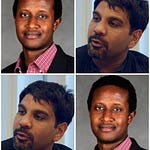It is difficult to overstate China's rise in terms of economic development in the four decades - growing from one of the poorest countries to becoming the world's second-largest economy. China has also become an important geopolitical partner to many developing countries, and it is quite common to encounter talk of the ‘‘China model’’ of development as being more suitable for many African countries that have struggled with economic transformation. Joining me on today's episode is political scientist Yuen Yuen Ang to unpack what China did during the reform years and the many ways that process is misunderstood. She has two excellent books (linked here) on China, and she is one of the most careful, thoughtful, and perceptive scholars I have read.
Transcript
Tobi;
Welcome to Ideas Untrapped, and my guest today is Yuen Yuen Ang who is a professor of political science at the University of Michigan. She has written two very important books on China. And I want to talk to her today about the first book, How China Escaped the Poverty Trap. Welcome, Yuen.
Yuen;
Well, thank you very much, Tobi, thank you for having me. And I very much appreciate your support.
Tobi;
In global development today, it's almost impossible not to talk about China. China has become so important both economically and geopolitically, and we know that the picture or the situation was quite different 40 years ago. Another thing with what China has done in the last four decades, I mean, two-thirds of the global reduction in poverty is in China and so many other amazing things, is that there's a lot of, should I say, content on China and in my experience, it feels a bit like quantum physics and that Feynman quote, which is the more you read on China, the less we understand.
But, reading your book for me as being quite illuminating. Again, I want to thank you for writing it. So the first question I'll ask you is, very early in your first book you made what I think was an important distinction, which is the difference between market-creating institutions and market-preserving institutions. Can you elaborate more on that? And how China was able to take advantage of the former?
Yuen;
Sure. Well, first of all, I really love the quote that you used. And before I jump into the question that you just asked, I think it's useful to respond to your comments, which I think it's very insightful, which is that everyone is very interested in China. There's a lot of talk about it, but it feels confusing.
And so at the outset, when I write my books, I think one of the things that I wanted to set out to do was to provide an integrative account of China's development since its market opening in 1978. And I stress the word integrative, because I think one of the sources of confusion that you alluded to comes from the fact that there are many, many accounts about China's development, but they tend to focus on only one aspect.
So some will talk about trade, others might talk about economic policy, so there are so many different topics about China. But what people need is an integrative account that puts all of these different elements and variables together.
I really put them on a timeline to help people to understand, sort of, the different factors that were salient at different points in time. And this is important for correcting the misconception that there is one China model, like some kind of blueprint that was created at the outset and designed to help China take off.
So that was the kind of broader backdrop that motivated the way that I write my book, in particular, the first one. Let me now come back to your original question, which is the concept of market-building and market-preserving institutions.
And the important thing to understand about institutions is that economists have all agreed that good institutions, such as rule of law, such as formal accountability, such as modern courts, that all of these good institutions are essential for growth. And you have famous books like Why Nations Fail pretty much making similar arguments. And that then translated into the good governance agenda that was advanced by International Development Agencies, such as the World Bank.
So for about, I would say, 1990s to the present day or so, there was a great deal of attention and hope that if poor countries could get institutions, right, if they could have first-world institutions, then they will be able to have economic growth and become developed.
And when I look at the China case, that obviously does not follow that formula, because if you look at the early parts of China's growth, and even until today, there are so many dimensions of China's institutional design - everything from the ownership of companies, to the property rights, to the design of bureaucracies that just don't conform with what we think first-world good institutions should look like. So why is it that China has been able to grow its economy without those first-world institutions that economists say are the preconditions for growth, and this has been a long-standing puzzle in political economy?
So from my investigation, what I find is that the fallacy with the conventional wisdom is that it thinks that there is just one universal set of institutions that are necessary for growth, namely, the first-world rich country institutions. But in fact, what really happens in the course of development is that countries actually have to develop qualitatively different institutions for early and late stages of growth.
And those institutions at early stages of growth, that can support the growth process can actually look very, very different from the first-world norms. They can look in ways that conventionally we would dismiss as dysfunctional or corrupt. But those institutions can actually work very well at early growth stages. And subsequently, however, when the economy takes off, and it enters into a more mature stage of development, and then you begin to see that, yes, you do need institutions that are more like fist-world institutions, such as formal regulations, private property rights, and so forth.
So that is why I make a distinction between market-building institutions and market-preserving institutions.
Tobi;
I mean, one important thing that I also learnt from your first book, and you can please correct me if I'm getting this wrong, is that (it's interesting you alluded to economics accounts of China's rise) ever since the works of people like [Robert] Wade and [Alice] Amsden talking about the East Asian miracle, there has always been this importance for the role of the states. And then the discussion then polarizes into, do you use the State? Or do you use the markets? And policymakers in different developing countries choose what they see, you know, and some stressed the importance of state capitalism.
But what I learned from your book was that it really doesn't matter the kind of political system you run. Every political system in history that has gone through that stage has used market-building institutions. One thing you also talked about quite early in the book is this concept of directed improvisation. What is that? And how did China use that?
Yuen;
Yes. The conventional wisdom when people look at China's case is to assume that the recipe for its economic growth must be centralized political control because it is an authoritarian regime. So when people talk about the China model today, it's reduced or dumbed down into, basically, authoritarianism, plus some elements of capitalism.
And I question that conventional wisdom in my book. If the answer was simply authoritarianism and centralized control, then China would have prospered long ago, under the reign of Mao, where you had absolute centralized power under one leader, even more centralized back then than it was today.
So it couldn't be that centralized political control or authoritarianism is the answer to China's development. Instead, what really happened is that the central government under Deng Xiaoping was the reformist leader who took over thus helping change the role of the central government from that of a dictator to a director.
And what the director does is that it focuses its job on setting up conducive conditions for bottom-up innovation and bottom-up adaptation, primarily among local governments. So China is politically centralized, but it's economically and administratively decentralized.
But in encouraging local governments to adapt and to find local solutions to local problems. The central government still plays a crucial role in terms of providing direction, setting up the rules of the game, defining what the goals and targets should be. So these were the ways in which the central government “directed” the process of adaptation. So directed improvisation simply means you have the merger of direction from above, with bottom-up adaptation among local governments. So in the first 30 years of reform, which most people call the reform period, which is up to 2012, what you can see in China is actually a diverse range of regional economic models, and not just one. And if you take even any county or city in China, and you trace the history of development over those 30 years, you'll find that the role of the government and the development strategies that that particular city undertook kept changing over time.
So I think it is this highly adaptive element of the Chinese experience that is often neglected, or not understood in the global discourse about China because people are overly distracted by stereotypes about authoritarian control.
But the point that I think is most valuable, and that China should talk about more is the adaptive element under the reformist Deng government and the amount of diversity that they were able to create despite being a formerly authoritarian state.
Tobi;
One distinction I'll also like you to elaborate [on] is control versus influence, which was something I also got from your book and found interesting. I remember reading Robert Bates, writing about the political economy of Africa. He talked about the importance of control regimes, you know, having a closed economy, price distortion, regulation of industrial outputs, regulation of markets, these were things that were also part of China's economy and policymaking during the Mao era, you know. But we also observed that during the reform years after 1978 policymaking also was not thrown into chaos, you know, like the opposite of control. So how did China manage that balance, particularly substituting influence for direct administrative control of policy?
Yuen;
I'm really glad that you raised this subtle point, but an important point. So let me give some theoretical background before I elaborate on the China case. If you look at the conventional thinking about politics and economics, it is really a literature that is obsessed with control. Right? So it's always about someone controlling someone, it's like the state controlling civil society, or politicians controlling bureaucracy, central governments controlling local governments.
And this fixation with control is, I think, an extension of a mechanical intellectual paradigm. So if you look at the beginning of my book, I talked about how and why I use a complexity paradigm to interpret the Chinese development process.
The conventional paradigm is a mechanical one. So things about how things work as if it functions as a machine. And indeed, the top economists do explicitly say that they think in machine mode. So when you think in machine mode, everything looks like a control problem. And so that's why you see the literature and Political Economy being so fixated on control.
But what we don't talk about enough, or sometimes not at all, is the other element of human activity, which is, apart from trying to control we also adapt all the time, including in Nigeria, and we have very little understanding in the political economy context of how do people adapt? Why do they adapt? What are the conditions that make adaptation possible? What are the products of adaptation? These are the various questions that we don't ask in political economy.
So once you move to the Chinese context, and you apply the lens of adaptation, it immediately opens up a very different story from the traditional one that was entirely about control. One of the things that is important to know when we think about China is that control is always an element present in the Chinese political context. And it’s present in a big way because it is a top-down political system. So I'm not saying that there is no control in China. Of course, there is; such as censorship.
But what I'm saying is that as the reformed leadership under Deng took over from Mao, it dramatically change the role of government as well as the mixture of control and adaptation. So on under Deng, of course, there were still policies of repression and control. The family planning policy, for instance, required a great deal of forceful implementation. But it also dramatically increase the amount of adaptive activity that the government carried out.
So the distinction I make is that when you are fixated on control, what we conceptualize is that politicians want to control the outcome. So they already have a predetermined outcome or solution, and they're just trying to control everyone so that they can get there. Right? When I use the term influence, however, the assumption is that oftentimes, the leaders actually do not know what the best outcome should be. They don't have the solutions to the problems that they face.
And this was absolutely evident in China's market transition process, because that was something that China had never tried before, it had never tried to move from communism to a market economy.
So oftentimes, these leaders themselves do not actually know what is the best solution that they should create. And so what they did is instead of trying to control outcomes, which presumes that you have a lot of knowledge and know exactly what's best for you, they instead try to influence the process of coming up with solutions by, for example, encouraging local governments to come up with solutions that are tailored to local conditions, but at the same time setting up some guardrails in this process of experimentation.
So that is what I mean by the difference between trying to control an outcome versus influencing the process of problem-solving.
Tobi;
One thing I so love about your first book, which you've also alluded to in your answer is appreciating that a society and the economy is a complex system. And you said that an alternative to control in complex systems is to influence the process of adaptation and change. So I want you to talk briefly about how these influence the design of the reform packages themselves in the China reform experience, particularly the three key mechanisms you talked about in the book, which were variation, selection, and niche creation. How did that work?
Yuen;
Yes, I'm happy to do that. Let me focus on the first two parts because of time, which are variation and selection. And these terms come from the well-established scientific literature about how adaptation happens.
So adaptation begins with generating a variety of possible solutions. So that's why the first mechanism is variation. And this is followed by selection. So from the possible pool of solutions, you pick one, and you test it out, collect feedback and decide "do you want to continue with this solution? Do you want to share this solution with others, or perhaps you find out the solution I picked didn't actually work so well, so let's select another one."
And niche creation is about creating differences among members of the units so that these members can coexist, instead of competing head-on with one another. So I use these mechanisms to organize different parts of the book in explicating what were the mechanisms that the central government designed in order to structure the process of adaptive governance in China.
And on variation, I look specifically at the system of political communication in China. China is a top-down political system. So the way the top government sends commands - written directives to the local governments - is the primary and most important mechanism by which it commands, instructs, and guides the whole bureaucracy.
And normally, this is a system that, frankly, almost nobody studies because it doesn't really seem interesting. It's a command system. So you think that, you know, whatever, if Beijing wants to send a command. But what I argue and actually show in the book is that the command system in China actually functions in ways much more interesting way can imagine. And specifically, what I show is that in the Chinese political system, the central government would send out three different types of signals.
The first signal is what I call black signals. These are written directives, where the language is explicitly clear, saying, "yes, you can do this. Yes, the local governments all over China, you can do this." And the second type of directive is what I call red signals, which explicitly says, "no, you cannot do this." So, for example, "no, you cannot exceed the amount of water use by this amount."
And then the most interesting one is the third category, which is the grey directives. So commands that are deliberately ambiguous. And there are a lot of ambiguous commands and instructions that occur in the Chinese political system. And they still do today.
And I argue that what these ambiguous commands do is that they actually provide room for experimentation. Because from the perspective of the local officials when the command is vague and ambiguous, and broadly stated, it means that they are free to interpret how to implement that particular instruction.
And when they experiment and try things out, it produces, generates a variety of possible solutions. And from these possible solutions, the regulators in Beijing can then take a look at these options, many of which they had never thought about before and then decide, "among these possible solutions, are there some really good ones that we should scale up to regional or national levels," or sometimes they might also realize, oh, some local experiments turn out to be not good. And we are going to change our commands from grey to red and say, No, I don't want you guys to try this anymore.
So through this varied and dynamic system of commands, is one example of a mechanism by which the central government in China is able to calibrate the amount of discretion that it gives local officials, allowing them to experiment when the central government wants to experiment, and then also providing a mechanism for the central government to collect feedback to scale things up if they want to. And also to scale things down, if they decide that that is the right thing to do.
Tobi;
So it's really hard to talk about China, at least the way China is being written about generally, without talking about state capacity. Like you talked about in the early part of the discussion that analysts and scholars usually take one thing and focus on that when discussing China, and there is always this talk about state capacity being the be-all of how China was able to reform itself and become rich. You know.
Some say it's the bureaucracy that was inherited from the communist regime, some talk about the 5000-year history of civilization, and so many other theories. But you've discussed this often on your Twitter feed, and in other appearances, that when we talk about the bureaucracy, we usually have the Weberian Western-type democracy in mind, and that the way scholars and people discuss this is like, it's the only way to achieve bureaucratic coordination.
But you've also challenged the idea that there are other forms of bureaucracy. So I want to ask you, how did China achieve that bureaucratic coordination without feeding into the Weberian archetype? You know, so to speak, because the challenge with most developing countries like Nigeria, which I am familiar with, is that you often have pockets of effectiveness in different arms of the government, but it's usually difficult for one vision to be projected, you know, and be implemented. So how did China achieve this through its bureaucracy, what were the design elements?
Yuen;
I am very glad that you brought up this important point. It is a point that I keep making in my books and in other forms of speaking. It is also a point that many people find hard to accept. The reason for this is that for a very long time, the conventional wisdom has always subscribed to the view that there is only one standard for good institutions, for stake capacity, for good governance and that is to look like rich Western nations.
Now, the conventional wisdom doesn't put it this way, but if you look at all of the global metrics that are created, regardless of the names that are coined for them, it's always the same countries that are ranked in the top 10. And it's always the same group of countries, including Nigeria, and sometimes China that's ranked at the bottom, right?
And so this is very deeply entrenched in both academic and popular thinking that there is only one standard in this world for good governance and good institutions. And that we should only use that benchmark. And when we look at developing countries, their situation is only accessed in terms of their distance from this ideal type.
So things in developing countries are not perceived as being qualitatively different, they are instead perceived as deficient because they don't comply with the standard expectation of how things should function. And so including in the discussion about state capacity, one of the core elements of state capacity is bureaucratic capacity. And so as you alluded to, everyone subscribes to the legal-rational model that Max Weber had portrayed 100 years ago. And it is assumed that the only kind of effective bureaucracies are the ones that have these Weberian qualities, and everything else must be corrupt or dysfunctional.
And the reason that I questioned this conventional wisdom is that I think it is... first of all, it reflects a first-world bias that people are either unaware of or unwilling to admit. And second of all, it is limiting and distorting. Because when you assume that there is only one standard, you cannot see qualitative or categorical differences. Meaning that perhaps in this world, we are actually comparing apples, oranges, bananas and guavas. But when you say only the Apple is the legitimate fruit, and then you look at the banana, and you think, "Oh no, the banana is deficient, because it doesn't look like an apple," right? So that is why it becomes this very narrowing logic.
And what I find from both my historical research and my field research, in the case of China, as a very good example is that the qualities of an effective bureaucracy were actually very different at the early and late growth stages. So the given example, I show that in the early 1980s, 1990s, when markets first opened in China, the country actually relied on bureaucracies that had non-Weberian characteristics. So they were not specialized. Local governments would mobilize every agency to go and recruit investors. And this defies Weber's rule of specialization and technocracy. They also create a mechanism where these bureaucrats were basically taking a cut from the investments they could bring in which in economics, we say high-powered incentives. And in Weberian bureaucracy, you're not supposed to provide high-powered incentives, you're supposed to have these very modest rule-abiding and somewhat boring bureaucrats in office.
And the reason why these non-Weberian qualities work very well, in the beginning, is because they made the best use of what China had in the beginning, which is it had a communist apparatus and a communist apparatus [that] is good at mobilization.
It made use of the personal connections of local government officials and these personal connections substituted for formal property rights, and so forth. And so even though these individual characteristics would appear to be wrong from the first-world perspective, they were actually functionally a good fit with the objectives of early development.
However, as the process goes on, income rises, the markets become more complex, businesses grow and so forth, the society and the economy had different objectives, had different priorities about growth. They no longer wanted just any type of growth they wanted, instead, quality growth in states-selected priority sectors. And that's when you begin to see an evolution in the bureaucracy towards the more specialized and technocratic forms that we see in first-world countries today.
So to sum it all up, there are two takeaways. The first takeaway is [that] the good institutions that are often touted as universally ideal institutions are actually good institutions suitable for advanced stages of growth. But early stages of growth may actually require functionally and qualitatively different institutions that make the best use of what low-income societies have.
So that is the first takeaway. And the second takeaway is that we should drop this assumption that there is only one standard because that prevents us from seeing potentially creative solutions throughout the developing world.
Tobi;
So your second book, "China's Gilded Age: the paradox of economic boom and vast corruption," I would say, also slayed another dragon for me personally, only that the dragon is not China.
So from my experience in Nigeria, when you talk about corruption, the almost - I should say, self-interested response you get from politicians is that there is corruption in other places. And from somebody coming from a civil society background or even an average citizen, that answer is unpalatable, because the way we have been made to think about corruption is usually about the overall level of corruption, the quantitative level of corruption.
But in your book, you made it important that the qualitative aspect of corruption is also important. So can you please briefly explain the difference? How did you come about this insight of unbundling corruption, so to speak?
Yuen;
Yes. So the second book is called China's Gilded Age. And it is a sequel to my first where I zoom in on the relationship between corruption and capitalism. And the core argument of the second book is actually quite simple. What I argue is that corruption comes in different types. And different types of corruption have different forms of harm. And I focus on one particular type of corruption that I call access money: elite exchanges of power and wealth.
And I show that in many contexts, not just in China, access money can actually encourage businesses to do more business; because politicians provide them with conducive conditions. But that this form of corruption results in indirect risk and harm that is nearly impossible to quantify. And so once we, in particular, zoom in on access money, we can understand why there are many economies that are prosperous, on the one hand, but on the other hand, have many structural distortions and risks.
And in addition to China, the other country that fits this model is actually the United States. So whether you look at the United States in the late 19th century, the original Gilded Age, or whether you look at the United States during the 2008 financial crisis and today, you'll find that these are wealthy capitalist economies that produce rapid growth, but also [produce] inequality - a great deal of inequality and a great deal of policy distortions and systemic risk.
And that is the kind of corruption that is neglected that people don't look at. The reason for this is that most people, when they think about corruption, they immediately think about the forms of illegal corruption that they encounter in their daily lives. So when a policeman stops you and extracts a bribe from you. Now that is obviously corrupt. It is an act of bribery, it is illegal, it is extortion. And so the focus is on this type of corruption. Whereas a lot of the popular discourse neglects the other type of corruption - access money - which has always been actually central to the history of capitalism.
Tobi;
I find that book very insightful. I'll give you a brief anecdote. The former president during one of his media appearances went on television and made, I would say, the error at the time of saying that corruption is different from stealing. And it happened to be one of the things that became a public relations nightmare for him.
So I just want to ask you, for countries that are dominated by the destructive types of corruption, can they transition to access money types of corruption, and can they also avoid the inequalities that come with it? And I should say that you stressed in the book that corruption is not good, which is another wrong message that a lot of people take from the book.
Yuen;
So my book, China's Gilded Age, unfortunately, as you pointed out, is widely misunderstood. As soon as people see the story of corruption coexisting with growth, they take that argument out of context, and start screaming that, "oh, my god, she's saying corruption is good for growth, and she's saying we should do more corruption."
And so there have been quite a lot of nonsensical reactions to the argument. So at the outset, let me stress that actually, I made clear throughout the book, and over and over again in my speaking that all corruption is bad. This is not an argument about corruption being good in any way.
All corruption is bad, but the harm is expressed in different ways. And so that is why I use the analogy of drugs. I used the analogy of toxic drugs to refer to extortion and embezzlement. These types of corruption have absolutely no benefit, you immediately see the harm, and it immediately destroys the economy. And Nigeria is a good example of this type of highly destructive corruption.
And the second type of corruption I call speed money, I refer to that as painkillers. So you can think about a business that pays a small bribe so that it can get a business license faster. And that corruption is a painkiller in the sense that it allows the business to buy some conveniences, gets rid of some headaches, but that doesn't actually help the business to make more money. Ultimately, for the business owner, it is a hassle. And it is a cost. So that's not good, either.
And the last type of corruption, access money, I call it steroids. So steroids, as we know, is a kind of drug that dishonoured athletes use to help them grow muscles and perform superhuman feats. But if you keep using steroids, then ultimately it's really going to have a whole range of serious side effects that accumulate over time. And access money is a type of corruption that you find in high growth or wealthy, crony capitalist economies, right? So what people should take away from this book is not that corruption is good, or that countries should do more corruption, which obviously would be nonsensical. Instead, they should really think about the following issues.
First of all, countries should take a look at what is the dominant type of corruption that exists in their country, and think about the appropriate methods to fight the dominant type of corruption.
For instance, in the United States, extortion, petty bribery, these sometimes happen, but it's not common in the United States. But over there, the dominant type of corruption is legalized access money. So lobbying has become a gigantic industry. And so the United States would have to come up with very different ways of fighting the kind of corruption that dominates in their society.
Conversely, when you look at Nigeria, it has all four types of corruption that I talk about and so in a country like Nigeria, there has to be a focus on fighting all of these four types of corruption, but particularly the toxic ones. So embezzlement, extortion, imposing petty bribes, and thuggery on people. These types of corruption have no benefits at all. They drain the economy and the burden falls most heavily on the poor.
So countries have to think about what are the measures they can take to bring down this overtly, growth-dampening corruption. And if you look at the Chinese experience, what happens as it developed over time is that the structure of corruption changed, and it invested at least 20 years of efforts to really bring down extortion and embezzlement.
And although I had an entire chapter devoted to that topic, a lot of people just ignore it. And instead, they run with the misleading conclusion that oh, we should do more corruption. They ignore my discussion about the 20 years of effort that China put into bringing down extortion and embezzlement.
So for readers in Nigeria, start with the obvious things, things like extortion, embezzlement… of course, they're wrong; of course, they're terrible; of course, they're damaging, so do something about that first before you even attempt to think about how can we transition to more advanced forms of crony capitalism like we might see in some advanced economies.
The other takeaway I would add... the third takeaway that I would emphasize is that the part about access money, it’s not about how do we encourage more access money corruption… the way to think about that takeaway is how do countries like Nigeria, create incentives for government officials to have a personal stake in economic outcomes? Right.
And so what happened in the Chinese case is the system that I call profit sharing. Meaning local officials have a stake in economic growth, which comes both in terms of their career, as well as in their financial payoffs. And that shows up as access money.
It doesn't mean that other countries should have more of that kind of corruption. Instead, the real lesson is, if not this type of corruption, are there other less damaging ways in which we can create incentives for government officials to actually have a personal stake in economic development?
Tobi;
One final question, I know our time is gone. I know scholars usually, sometimes, shy away from making policy proposals but for countries that are also interested or ambitious about escaping the poverty trap, what… maybe theoretically speaking, or practically, what are the three things that you would recommend from your research on the China experience? Not necessarily copying China, we know that has pitfalls, so what would you recommend?
Yuen;
It's a good final question to wrap up. Um, I would sum up with three takeaways. The first takeaway is, really work hard on fighting the overtly growth damaging types of corruption. It is a simple takeaway, but a lot of people actually forget about it. So things like embezzlement, things like extortion.
If Nigeria could bring down the level of these damaging types of corruption, of course, immediately, you will see the economic and social benefits. So work hard on that.
And then the second takeaway is, how is it possible for government officials in Nigeria to have a personal stake in collective outcomes? I don't have the answer. But I think it is a question that Nigerians have to sit down and think about.
One of the things that are often missing in developing countries is a discussion about incentives and also about a sense of personal ownership in shared outcomes. People prefer to invest their energies in criticizing politicians and so forth. But if you think about it from an institutional perspective, why should that particular politician care about the collective outcome? Right.
So how can we create those incentives, which doesn't necessarily have to be monetary. It could also be non-monetary, it could be reputational, how do we make them care? Right? So that's the second thing to think about.
The third thing I would emphasize is a principle that I call using what you have, and China illustrates that principle, richly. Using what you have means that every society, even one that is a low-income society has a lot of indigenous resources, they have human capital, they have creativity.
So the first step of development is not to go and copy rich countries, it is also not to sell your oil resources, but to really make the best use of these indigenous resources. And so for those who know my first book, actually, in the conclusion, I have a chapter about Nollywood. And that's an excellent example whereby under desperate circumstances, the people in Nigeria actually created an industry from the bottom up using what Nigeria had at that particular time.
And so there are so many instances throughout the developing world where there are actually a lot of indigenous resources, they are untapped, or they are ignored or they're dismissed. Because we are so used to thinking that the only right solution is to look like rich countries. And we have to drop that mindset.
I think it's part of an extension of a colonial mindset as well. And developing countries have to develop a certain sense of intellectual independence, as well as confidence in seeing the potential that is already existent in every society, and make the best use of those resources to kickstart entrepreneurship and new industries.
Tobi;
Thank you very much, Yuen Yuen Ang, it's been fantastic talking to you.
Yuen;
Thank you very much. It's a real pleasure to speak with you.













Share this post